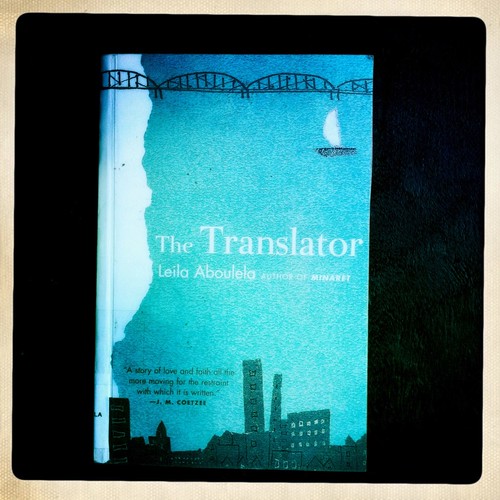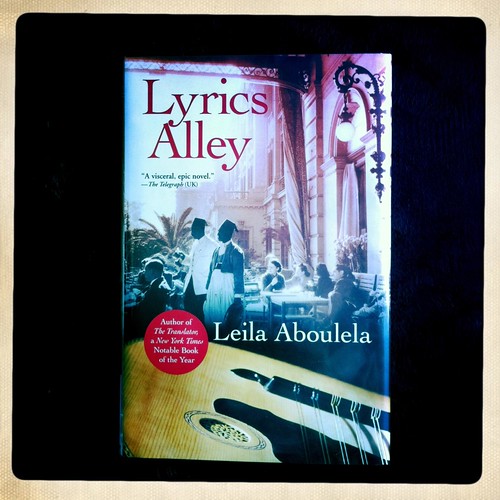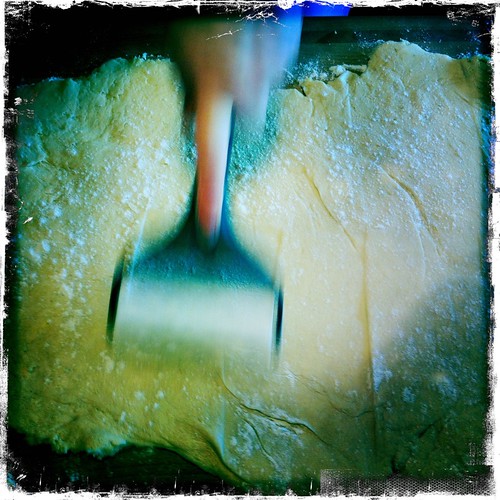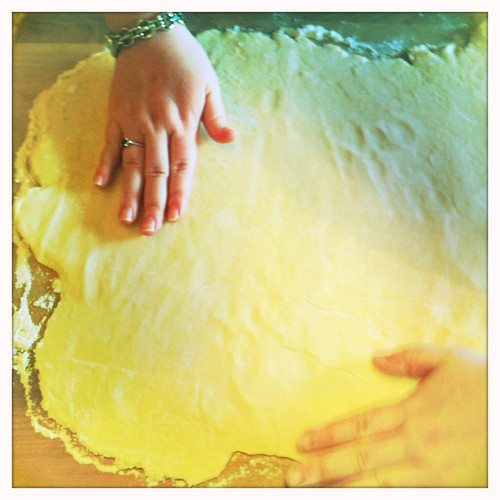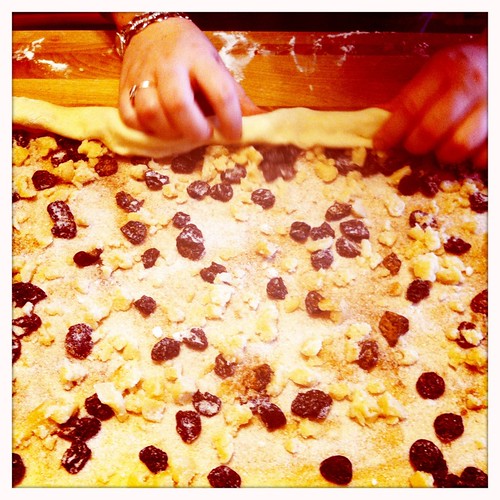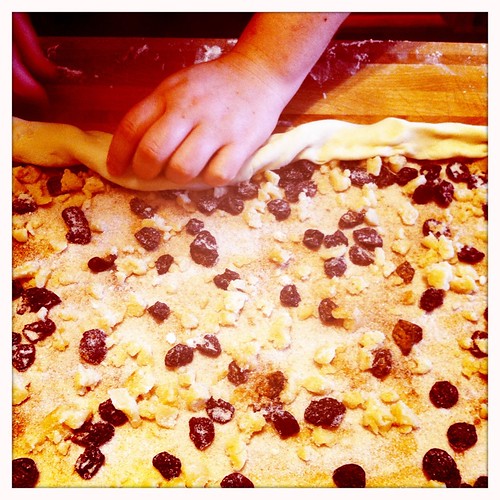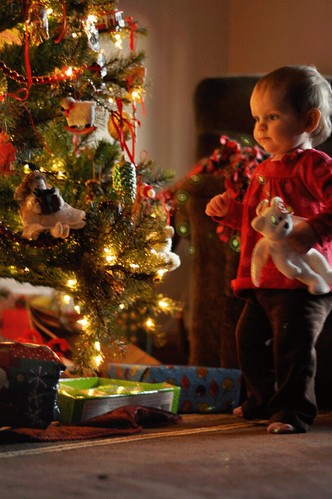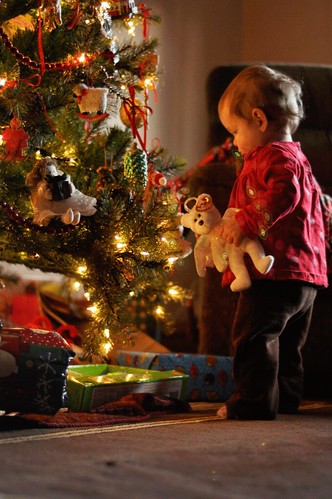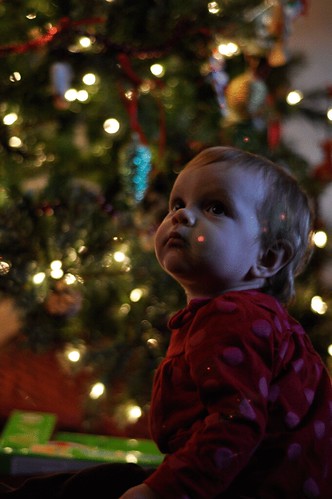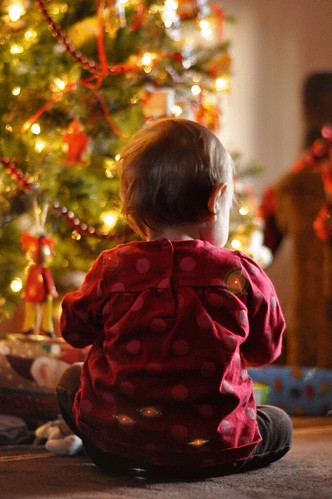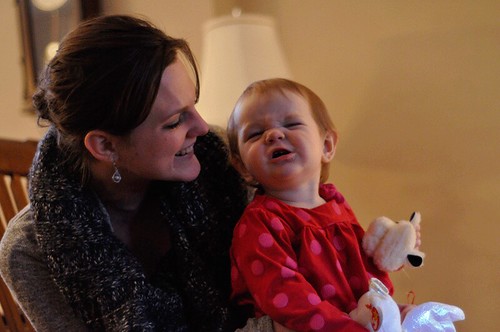I just finished two books by Leila Aboulela and I'd welcome the opportunity to read another. Both were entrancing reads that allowed a glimpse into a world so different from my own. I love adding books that offer that kind of perspective, mostly because it gives me an opportunity to learn and observe traditions, beliefs and lives carefully cultivated in a particular worldview. Both of these books are seeped in the country of Sudan and the religion of Islam. And they are so welcoming to the reader. They sort of invite you into the a world without over explaining what is going on but still acknowledging that the reader might not know all the details of the traditions. I felt brought into something new while also aware of my otherness.
The Translator, 1999
This is the story of a grieving widow who falls in love. The common human connection is one of empathy throughout the struggle to process loss. Additionally, the main character finds herself living in a kind of exile in Scotland, far from her home in Sudan. As a reader I could feel the contrasts of chilly Scotland and warm Sudan. Even though our cultures were vastly different I could also appreciate the commonness of pain no matter how it is experienced. The woman's tale is further complicated by her identity as a Muslim and her distance from the Anglo world around her. Additionally, she falls in love with a man who is not a Muslim and while she tries to appeal to him to simply speak the words necessary to convert he is unable to do so for fear of being inauthentic. I found myself drawn in by the author and wrapped in the narrative of the main character. Hoping that she will find love in the midst of a difficult relationship with her former mother in law and a strained attachment with her young son. The universal human similarities dominate while also expanding into a view of Islam that is wide and rich.
Lyrics Alley, 2010
This book has been on my mind since I finished reading it. I've been running the story lines through my head and pondering over the characters. While I liked the first book by this author, I found this second one difficult to put down. Its plot captured me right away. The story is told by several different voices, each chapter switches its perspective. While some people find this disconcerting I usually enjoy it. Though I will admit it can be difficult to leave one person's narrative and jump to another if something particularly dramatic has happened.
Why did I enjoy this book? Most of the main characters that narrate are young women and men who are caught up in their cultural and religious expectations. I suspect that I found it interesting to step into their perspectives that were different from mine and yet oddly not that different. Again the thing that struck me about the book was the universal human condition that can be translated across cultural boundaries. That's not to say there wasn't a tremendous amount that was unfamiliar to me, there was! And I had to go look up words that were new to me like "hoash" which is used to describe a traditional home area, from what I gathered is partly an outside courtyard type enclosure. The book also exposed my ignorance of African history, highlighting the relationship between Egypt and Sudan. I found myself intrigued enough to google more of the history to aid my understanding of the novel.
One reaction I have to the book is challenging for me to put into words. I found the narratives of the young people in the book especially captivating. One of them Soraya, is coming into her own throughout the book and as she grows she is also trying to find her place in a society that is extremely conservative towards the roles of women. She is both bound by the customs of her culture and pushing for more freedom. She is smart and successful and comes from a wealthy family. But she also suffers a tremendous tragedy. Her childhood love, the man she is betrothed too from a young age become paralyzed. The reader watches her move through denial, anger and acceptance of this change in her life plan. While I grieved with her as she let go of love and moved towards a marriage that would ensure her freedom and independence I also thought the author masterfully handled her transition. This reaction to the book is complicated for me because I think it would be easy for an American woman to read this book and get stuck on the oppressive nature of some of customs. And let me be clear I think female genital mutilation is oppressive and traumatic! But on the other hand I think that their needs to be balance in assessing a culture that is not your own. Striking that balance can be difficult and I'm conscious of the reality of my own identity in thinking about my reaction to books like this.
Monday, January 30, 2012
Saturday, January 28, 2012
Putting some thoughts to paper...
Today was appropriately cold for January. It was that deceiving kind of cold day that looks bright and sunshiny from in the house. I was foolish enough to be swayed by the brightness that I left my gloves in the house when I went on a quick errand. Mid-way to my destination I realized my hands are freezing on the ice cold steering wheel. This was only a mildly shocking reminder that the temperate days of December have left us and been replaced with bitter cold.
One of my very best friends had a baby about a week ago. On a very cold and wintery day a new baby came into the world. She's been in early labor since several days earlier in the week, so it was time. I've had people around me have babies and even had one myself but she's my closest friend to go through the experience. I found myself pausing all day to wonder how she is and how she's feeling. We had a brief 20 minute phone call and she's been humoring me by responding to my texts but I am longing to sit with her and hear all her thoughts on the experience. I know she's busy and no doubt occupied by gazing at her newborn (isn't that what everyone does???) She's now a mother, when I saw her a few weeks ago I laughed and said it would be the last time before she was a mom. Now she is. In a moment, a huge life transition. I feel like the reality of the transition set in slowly for me. Yes, there was the shock of no sleep and new life but now I look over the year and see my slow progression into thinking about my child's well being first and considering my choices as mother and a person not just an individual.
I've also been thinking about what it was like the day Nemo was born. The newness of being a family of three and the intense emotions. The blissful moments of new babyhood. The delight at finding myself cozied up to my darling partner and delicious new baby. In my saner moments I've been recalling my experience in childbirth and the process of recovering afterward. But even that was an empowering feeling, to see a new life come into the world, it's cliche but amazing to behold. There is a delightful joy in those new moments of life. When Nemo was born I found myself staring into the faces of my mother and husband both of whom were crying. I was simply relieved that labor was over and had a rush of wonderful feelings (probably the natural oxytocin!) just by looking at my baby. But that first moment is ingrained in my head and I hope will stay there forever.
One of my very best friends had a baby about a week ago. On a very cold and wintery day a new baby came into the world. She's been in early labor since several days earlier in the week, so it was time. I've had people around me have babies and even had one myself but she's my closest friend to go through the experience. I found myself pausing all day to wonder how she is and how she's feeling. We had a brief 20 minute phone call and she's been humoring me by responding to my texts but I am longing to sit with her and hear all her thoughts on the experience. I know she's busy and no doubt occupied by gazing at her newborn (isn't that what everyone does???) She's now a mother, when I saw her a few weeks ago I laughed and said it would be the last time before she was a mom. Now she is. In a moment, a huge life transition. I feel like the reality of the transition set in slowly for me. Yes, there was the shock of no sleep and new life but now I look over the year and see my slow progression into thinking about my child's well being first and considering my choices as mother and a person not just an individual.
I've also been thinking about what it was like the day Nemo was born. The newness of being a family of three and the intense emotions. The blissful moments of new babyhood. The delight at finding myself cozied up to my darling partner and delicious new baby. In my saner moments I've been recalling my experience in childbirth and the process of recovering afterward. But even that was an empowering feeling, to see a new life come into the world, it's cliche but amazing to behold. There is a delightful joy in those new moments of life. When Nemo was born I found myself staring into the faces of my mother and husband both of whom were crying. I was simply relieved that labor was over and had a rush of wonderful feelings (probably the natural oxytocin!) just by looking at my baby. But that first moment is ingrained in my head and I hope will stay there forever.
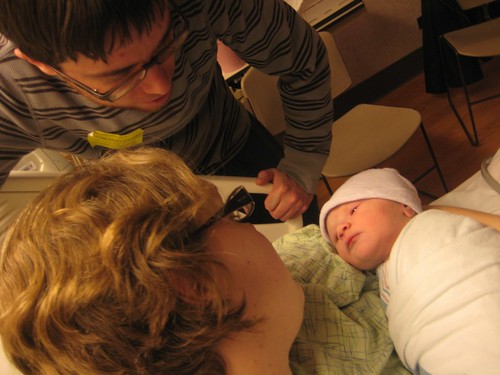 |
| Our first family shot |
Sunday, January 22, 2012
Making rolls
My sister, the chef, has started some new food traditions in our family. One of her best is these delicious rolls that include almond paste, dried cherries, cinnamon and sugar. Then you pour frosting over the. Yum! She make them last week for mom's birthday. They are quite the treat but took her all day to make!
Wednesday, January 18, 2012
Books by Kathryn Erskine
Mockingbird, 2010
This book arose out of the author's attempt to see the world as a person with Aspergers' and in response to the emotional upheaval of the Virginia Tech shooting in 2009. It's set as a youth novel.
I found it to be a delightful book that ultimately filled me with hope about the human spirit. Ironically, it is a person who struggles with emotions, both understanding and expressing them, who brings others around her into completeness. The main character is an elementary school student with Aspergers who has just lost her brother in a tragic school shooting. (Heavy material for a youth novel but very interesting!) Caitlin, the young girl, is struggling to understand her own process while also being totally confused by the emotional processes of others around her. She is literal and very logical, hallmarks of the this type of thinking. At times her responses to others leave you cringing but she also has a well developed sense of her own limitations. Often she knows she doesn't "GET IT" but the level of insight she demonstrates is so very humbling to the reader. Caitlin is perceived as "limited" by the world because she thinks a different way, sees the world through a unique lens. But her perspective allows her to move past some types of emotional baggage and get the core of the matter.
I recently read another book, "Be Different, Tales from a Free-Range Aspergian" by John Elder Robinson. It's an excellent first person explanation of what it's like to live in a world where all the rules are coded in a language you don't understand. "Mockingbird" offers another insight into how a younger person attempts to break the code of social skills and emotional content. I also appreciated that the school counselor is presented in a particularly positive and effective light. Yay, for a good impression of mental health!
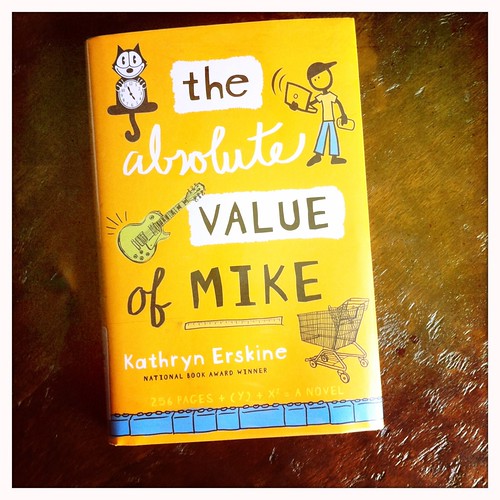
After finishing the previous book by Kathryn Erskine I checked out this book. It's also a young adult novel, written from a 14 year old's perspective. Interestingly in this book it appears that the father of the main character, Mike, has Asbergers. Whereas in Mockingbird the main character was telling the story through the lens of someone without the correct social decoder this time the main character's father lacks much social wisdom. However, the father is never diagnosed with this disorder, instead the reader is left to gather that from the interactions between father and son. The dad is rigid and has a difficult time relating to his son, conversely the son runs the household and is particularly socially aware.
I'm also picking up on a reoccurring theme in Eskine's books, presenting a child/early adolescent and having him/her accomplish something fantastic. In the first book Caitlin manages to help a community heal from tragedy and in this book Mike helps to get a child adopted from Romania. Of course there are other's who help and make it possible but ultimately it is this 14 year old's tenacity that makes it happen. I like the empowering feel of her writing, I wonder what the reviews say when written by adolescents and middle school students?
Mike is a fun character who is easy to like, and he wears his emotions on his sleeve so it's also easy to see what motivates him. He is perhaps a bit too lucky but that's not an uncommon trait for novel characters to have. I especially liked the parts where he expressed his anger and saw what happened. At times I wonder if we as adults communicate that anger is something that you "shouldn't" express openly. The author seems to let Mike have his moments of anger and then experience the consequences. Sometimes those are difficult to grapple with and other times they are useful. This may be a good model for thinking about talking to youth about expressing anger.
She's an excellent author that I look forward to hearing speak about her thoughts on the place of faith in writing a story. It would seem to me that both of her stories have a strong narrative about the power of an individual in the context of the community. I will be interested in to hear what she has to say.
Sunday, January 15, 2012
Saturday, January 14, 2012
chillin...
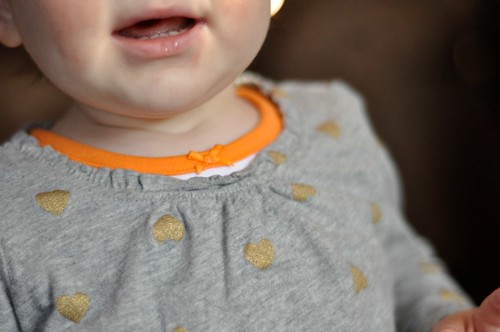 |
| up close... |
 |
| she's quite happy, I have no idea why she gives this mad face |
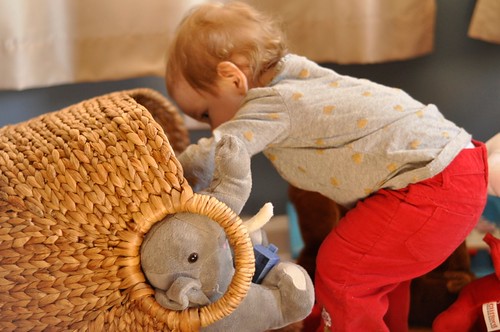 |
| visiting her animals |
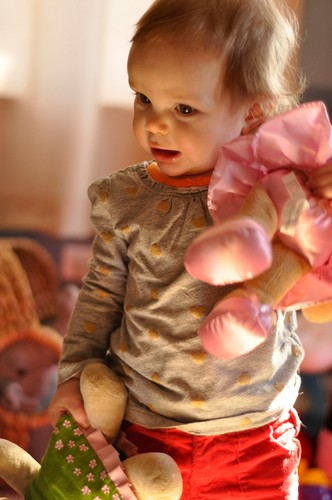 |
| loving her bears |
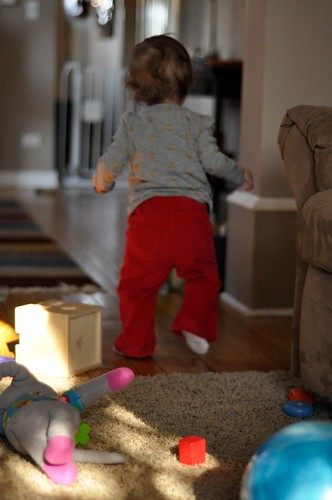 |
| away she goes |
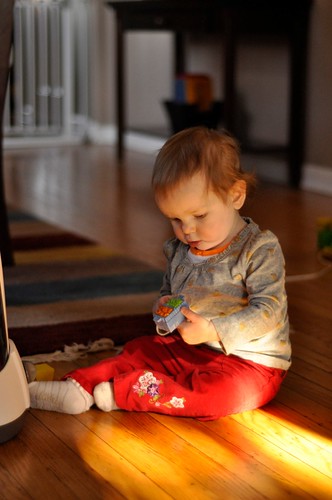 |
| new spot to play |
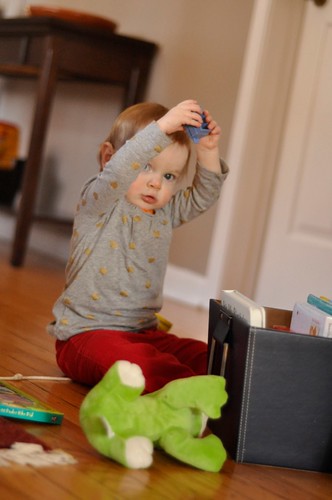 |
| so big |
 |
| happy face |
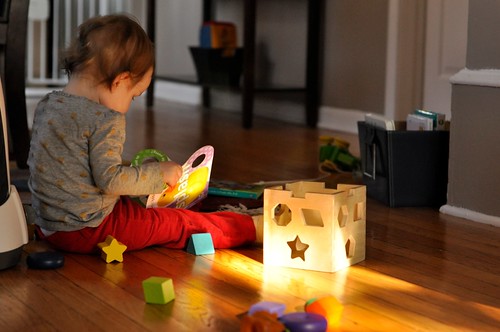 |
| sunny days are so nice |
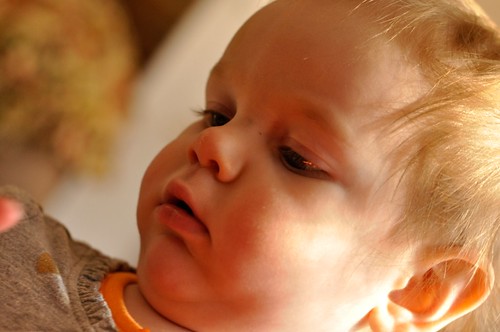 |
| intense face |
 |
| explorer |
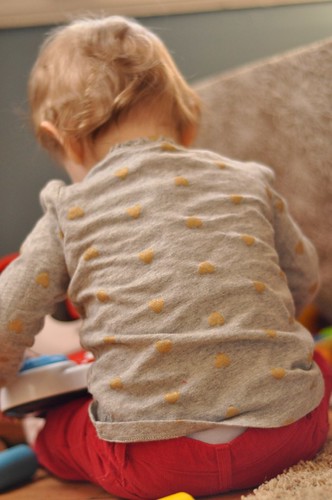 |
| busy |
Monday, January 9, 2012
The Madonnas of Leningrad, 2006
So now I need to plan a trip to Russia. This book made me want to head to the Hermitage in St. Petersburg and just wander it's great halls. The depictions of the art and the building's grandeur reeled me in. After finishing the book I read that the author had not visited the museum or the country before writing the novel. That seems unbelievable given the level of detail present in her book. But it's true, she did not visit Russia until after the book was written and bought by a publisher.
The books is small and yet haunting in a way. It blends the story of a woman's current reality with Alzheimer's and her regression back into her life during World War II. Her present day surroundings find her in the USA attending a grandchild's wedding. But in her mind she is continually being transported back to the 1940s and her time during Hitler's siege of Leningrad. The book transitions gently between time periods back and forth. It's almost as if you are inside the main character, Marina's, mind as she drifts between realities.
At first I was worried this would be similar to the novel, Sarah's Key, which I did not particularly enjoy. But instead this novel seemed to capture the story in a much more effortless way. It's a small book with short chapters and I managed to read it in a couple of days. But the story is much larger and the book seems to speak to that. It references the resent day however, the past is the main story. Really the reader learns very little about the life of Marina after she left the Hermitage. And the snippets that we do learn are pretty commonplace. It is her story while under siege that gets the most air time.
The siege is barren and cold. I remember learning about how the winter stopped Hitler from invading Russia but I don't think I realized that the people of St Petersburg were trapped. The cold and pervasive death is striking when placed alongside Marinas pregnancy and the museum that they preserving. I found the book an enticement to go and see the Hermitage myself. I'll add it to my list of places to visit in life.
One other thing about this book, it's the author's first novel. As is Purple Hibiscus, which I mentioned a few posts ago. They are remarkable stories and it's a bit mind blowing to me that they are the first thing that these author's have had published. I wonder how you follow them with a second story?
Here's Nemo enjoying some sunshine at the conservatory...
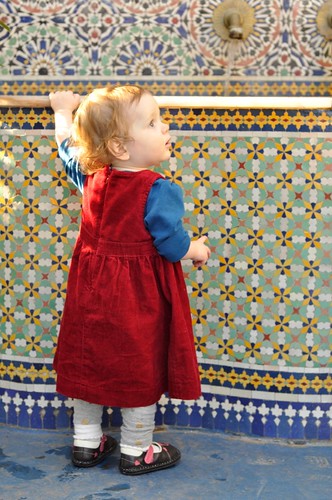 |
| In front of the fountain from Morocco |
 |
| Nothing is more interesting than dirt in a crack |
 |
| Except for a drainage hole! |
Friday, January 6, 2012
a few Christmas pics...
Tuesday, January 3, 2012
Purple Hibiscus, 2003
I found that I couldn't help but read this book through my psychologist glasses. The story is set in Nigeria and told by the adolescent daughter of a rich family, Kambili. Her lens is so very fitting for the narrative because it's somewhat limited in it's perspective. Throughout the story I found myself looking into her words and seeing beyond them and trying to figure out what an adult might say about the situation. But interestingly her limited perspective also kept me at times from seeing the obvious events right as they were happening. For example, it took me a little while to see the reality of the abuse that was occurring in their household. But once it was clear the signs seemed obvious and I felt a bit silly that I hadn't noticed it before. It is possible that the author intended for this to happen to the reader. Perhaps my experience mimics the narrator's own slow awakening and ability to verbalize what is going on around her.
Once the abuse became clear I found myself reading the narrater's emotions and reactions through my "educated about trauma but still affected by the details" eyes. It appears to me that the author got it right in terms of describing the daughter's conflicted emotions. Kambili loves her father desperately and is constantly trying to win his affection in some way but she is also driven by a paralyzing fear of what her father could do at any given moment. The control he has over her life is complete and full, in many ways he even rules her mind. As I read, I wondered about what causes someone to behave this way towards his own children. I also found myself wanting to grab the narrator and explain what was happening, to somehow help her see her worth and power. I think my reaction was in response to her own complete acceptance of the trauma she was enduring. This is where abuse really gets to me, because of course she was ruled by the tyranny of her father. She did not know anything else. She had never been taught to think for herself and her other parent, her mother, was also under her husband's complete control. He regularly used his wife as a punching bag for his frustrations.
The other things that were striking to me were the deep internalized issues around race and religion represented in the book. The father's character is so very complicated. So abusive to his family. A classic controlling male figure that tries to micromanage every aspect of his family's life. He's so abusive that you want to hate him. Some parts of me really did despise him. But as with all good human depictions, that just isn't the whole story. This man also gives generously and seems to genuinely care about his community. He publishes a newspaper that agitates against the ruling regime. He seems to sincerely believe in government reform and community justice. The paradox of the way he treats his family and the generosity towards the community is startling. Ultimately, I think his personal failings far outweighed his public goodness.
He also seems to be driven by a overly intense commitment to oppressive White imperialistic Christianity. His experience of being raised by White priests imprinted upon him a sense that faith should be harsh, cruel and unweilding. He also demonstrated some internalized racial oppression as evidenced by his continued hatred of things natively Nigerian. It appeared that becoming sanctified meant becoming as White as possible. Salvation seems to revolved around being perfect and presenting oneself as perfect. I found that I almost pitied him because of his childhood experiences living with these harsh catholic priests. I also found myself sad for the continued injustice perpetuated in the name of Jesus.
I wonder what the author will have to say about her depiction of Christianity throughout the novel? The father's faith lacks any true love and kindness of spirit while the Aunty and her family seem to embody a loving and kind faith. They practice the same Catholicism but with an open heart that does not create walls and instead builds connections. I wonder how the author considered this juxtaposition? The open and warm faith is primarily represented by Nigerians and the cold, harsh, angry faith seems to be primarily influenced by White priests and nuns.
Perhaps my favorite part of this book is watching the narrator begin to own her voice. She is almost mute throughout much of the book but through relationships with her aunt and cousins she comes alive. It is then that she is able to become more fully herself and even fall in love. The feminist in me simply loved seeing her take the control and power in her life back into her own hands.
Subscribe to:
Comments (Atom)

